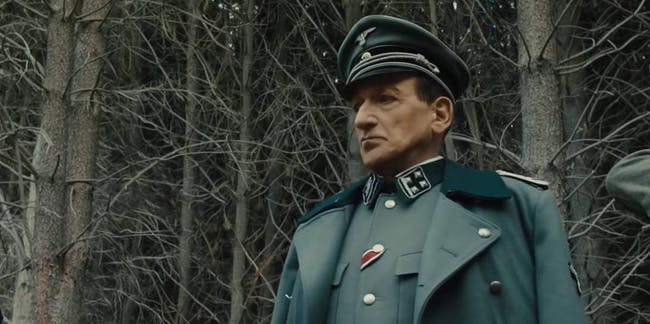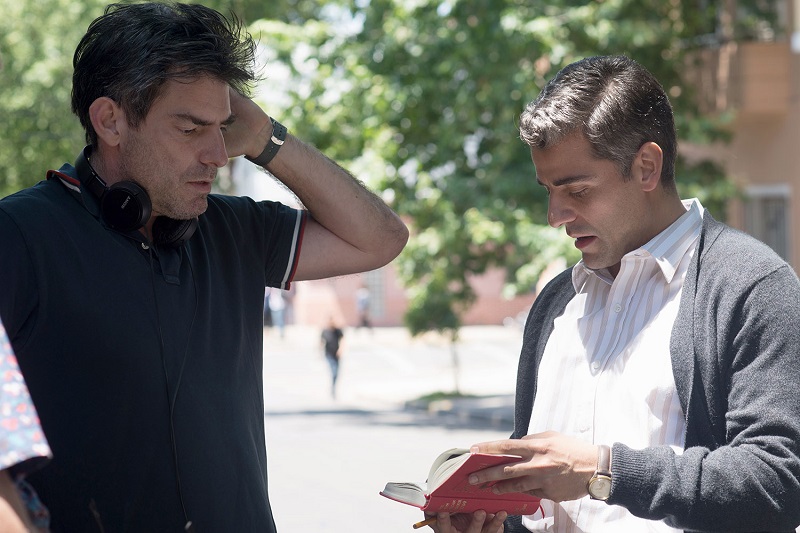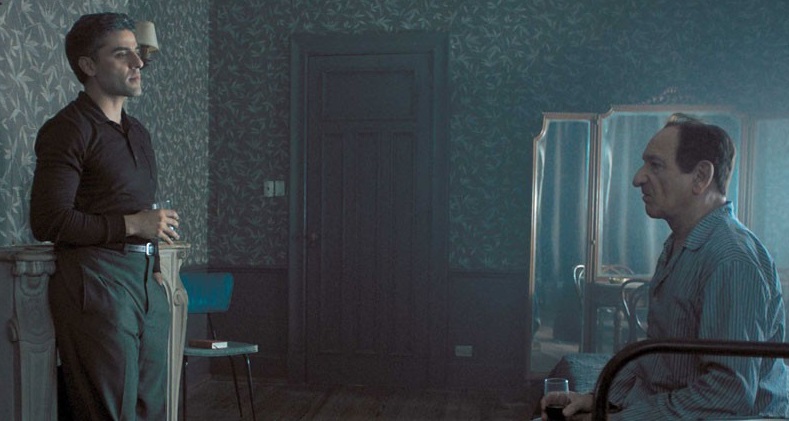Operation Finale tells the unbelievable true (and sadly timely) story of how Israeli Secret Service captured Nazi war criminal Adolph Eichmann in Argentina, years after the curtain was closed on World War II. Oscar Isaac and Sir Ben Kingsley put on a clinic, respectively as the Israeli Secret Service against Peter Malkin and the German Nazi orchestrator of all things evil, Adolph Eichmann.
The stunning film is directed by Chris Weitz and The Movie Mensch caught up with the legendary director for an exclusive phone interview where he speaks to the film’s timeliness (with recent headlines pointing out the rise in anti-Semitism) and how he hopes that Operation Finale showcases that what happened in Germany in the 1930s and 1940s could happen anywhere and anytime.
Weitz states that the situation in Germany, pre-war was not “unique.” In fact, look at current events and, “sentiments that leads to this race bating and demagoguery are present all over the place, just waiting for the right circumstances. I hope that people who see this will of course be reminded of what happened in the 1930s and 1940s in Germany and Europe will also recognize the traits in the characters we have now.”
The helmer also discussed getting a front row for that fireworks that are the extraordinary performances of Kingsley and Isaac when the captured and the capturer truly get to play their mind games. The director also shares some personal insight as to why this film was so important for him to make as well as the reaction the film has had in Israel.
The Movie Mensch: I was amazed that this particular story has not been tackled before over the years. Thankfully, it was a stroke of fate where the right person came along to tell the story. Why was it important for you to make this movie at this point in your career?
Chris Weitz: It connected me with my dad. He was a German-Jewish refugee and eventually served in the U.S. Army and the OSS, the precursor to the CIA. He wrote books about prominent Nazi party members after the war. I assisted him with that. These are things that I had been thinking about for a long time—even when I was making American Pie with my brother (laughs). It was second nature for me. The opportunity came along at a timely moment where we are coming to grips with the resurgence of nationalism and fascism around the world. That was an unexpected, I guess, tagline to the entire making of the movie.
The Movie Mensch: It’s sad and tragic, anti-Semitism is alive in well in 2018 in America. While you were making the film, did you think it would be timely or just an important tale to tale? Secondly, in hindsight, because it is so timely, your thoughts on the effect you hope a film like this can have on the populous?
Chris Weitz: We didn’t think it was particularly timely when we started on the process. It was years ago. All the things that have happened in the last two years were a surprise, as they were to many people. In retrospect it is not all that surprising. The situations that leads to these surges of nationalism and the anti-Semitism seems like a handy prop for that movement are latent in the pulse of a nation at any given time. One of the interesting things about the story as we try to tell it, is Nazi Germany was not unique. Sentiments that leads to this race bating and demagoguery are present all over the place, just waiting for the right circumstances. I hope that people who see this will of course be reminded of what happened in the 1930s and 1940s in Germany and Europe will also recognize the traits in the characters we have now. And these are not sadists, demigods and evil people. These are just people who under the right circumstances can make the wrong decision.
The Movie Mensch: It seems like we’ve seen the best of Sir Ben Kingsley, and then he shows up in your film and tops himself. You had a front-row seat to an electric performance. What was that like being in the room, and two, working with him?
Chris Weitz: It’s pretty amazing. At first, it’s pretty off-putting. He’s actually quite method in his preparation. The guy who showed up was almost half-Eichmann. I’ve had plenty of fun with him since and had some nice meals. When he showed up in Buenos Aires, he kept to himself. He wouldn’t leave his hotel for weeks and months. He was committed to be the ritual act of embodying this person, a person for whom he had tremendous distaste. He saw it as his obligation. There’s not actor who is more versed on these issues. He’s played Simon Wiesenthal, he’s played in Schindler’s List and other films, indicates how involved he is in these issues.
The Movie Mensch: These scenes just really make this film so powerful between Oscar and Ben. They’re rather quiet, given the past history of those two characters. Was there any rehearsal, how was that electricity come to be?
Chris Weitz: It was pretty organic. We didn’t have time to rehearse I wasn’t very keen to do so. There’s something really great when the first time that something is performed in front of the camera. There’s a raw chemical reaction that you can catch if you’re lucky. Other than a table read, that was very basic. There was wasn’t much interaction between Oscar and Sir Ben before. I do think the heart of the movie and all the bells and whistles are to serve this encounter. So, I’m really glad that you found that.
The Movie Mensch: Have you heard the reaction in Israel?
Chris Weitz: The reaction has been interesting, really mixed. A strong note I got that a lot of people are thrown by the portrayal of Eichmann as a human being. That was definitely a decision on our part—Sir Ben and our part. He shouldn’t have a German accent. He shouldn’t seem nefarious on the surface. The notion was that it was much easier to present him as a Hannibal Lecter figure. But it would be of more service to the audience to present to him the fact that the kind of people who did these things aren’t just psychopaths and sadists. They are normal people who are embolden by an atmosphere to do terrible things that they might not have otherwise done. I think that can be helpful and put more pressure on our sense of ethics rather than excusing us by identifying these evil doers as just the other.
The Movie Mensch: My favorite line in the movie is something like, “this is the first time that the Jewish people are able to hold their oppressors accountable in a court of law.” Is there a favorite moment for you, or hard to choose?
Chris Weitz: Oh boy, it’s hard to choose. It would probably be something between Eichmann and Malcolm, between Sir Ben and Oscar. There are moments of understanding between the two of them which seem like normal human interactions within this bizarre scenario that matter to me. There’s a line where Sir Ben says, “I think you’re afraid that the future will be like the past.” And there’s tremendous amount of wisdom in there, even though it’s said by a quite evil man.
Operation Finale is available now for digital download and is available on DVD and Blu-Ray on December 4.




